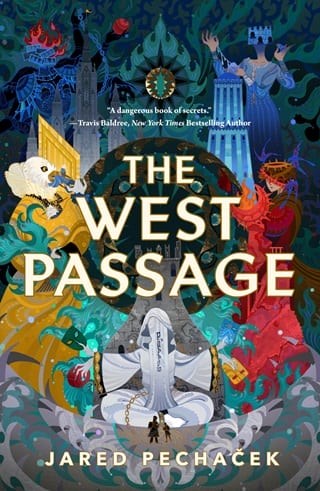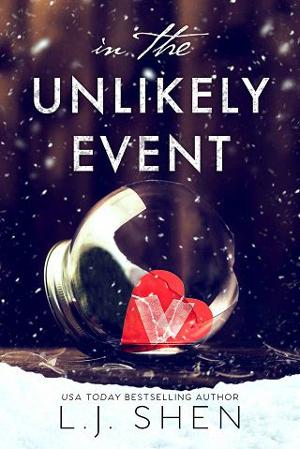4. Kew Makes a Friend
4. Kew Makes a Friend
The road was cracked marble. Once it had been highly polished, but the years had nibbled at it, and the corners of the paving stones were all broken, and grass grew between their edges. It ran straight and level between high walls, with no windows, doors, or decorations to be seen. Even the little postern by which he'd entered the Passage seemed to have been swallowed up in the distance. Some doves mourned along the wall tops, but aside from them, there was hardly anything moving except Kew and a few beetles.
After some time, the road crested a hill. Directly ahead were the roofs of Black, then the pinnacles and spires of the tower jutting up against the setting sun. He was level with the court rooftops, so the base of the tower itself must lie a little lower down. That was all right, but going up and down hills would add time to his journey. He needed to find somewhere to spend the night, and fast. Hawthorn had mentioned things that lived in the Passage. From the sound of them, they were not the sort of creature one would wish to meet in the dark.
There were still no doors or windows. As he went down into Black, the walls grew taller and taller, so their tops ran still at the same level. If he'd known how to get up to the parapet, he would have taken that route and not needed to worry about the road's ups and downs. Soon the crenellations were so far above him that they nearly closed over his head, turning the sky into a ribbon of velvety blue, and still the road went down.
How low did Black sit compared to the rest of the palace? Yellow, he knew, lay in a valley. Blue was on a hilltop. Red was on a hillside. But Black—according to all the lore of Hawthorn—was not hard to reach. Follow the lanterns, said one book. Well, the lanterns were in the tower, and the tower was still straight ahead, but the road was getting harder. Was it possible the lore was out of date? That, in this changeless place, something had shifted?
The granite of Grey seemed to have been replaced with a darker stone, but it was hard to tell in the dimming light. There were still no means of egress. His heartbeat quickened. There seemed to be footsteps other than his own in the Passage, but when he stopped, they stopped. Either something was following him, or there was an echo.
No—there was something. Jackals? The Grand Bestiary had a lot to say about jackals. Vicious progeny of the Beast, shed during one of its appearances in the distant past, breeding unchecked in the waste areas of the palace. As a boy, Kew had been badly frightened by a drawing in the book, wherein a person was pulled apart by a pack of them. Terror warped their face into something inhuman. They were sometimes seen in the Passage.
Kew pressed himself against the cold wall. It felt odd. His fingertips slid over it, searching for the source of his new unease. They encountered no resistance.
That was it. The walls in Black were slick and seamless, either perfectly joined or somehow built of one great stone. Given what he knew of the old Ladies, it could easily be the latter. Perhaps in daylight that would not bother him, but at night, it felt like standing in an artery of some great dead thing. His hand, going out still farther, encountered an edge. There was a deep groove etched into the wall, going higher up than he could reach. Since that was all there was to feel without walking, Kew resumed his flattened position. And still he heard the faint noise, resolving from a mere disturbance of the air into a mechanical clanking.
Far away in the Passage toward Grey, a faint greasy-yellow light glimmered. The rising road and the converging walltops played havoc with his sense of perspective, but the light seemed very high up, hanging above the road as if from the parapet. It grew larger and the noise increased in volume. The echoes were sharp and horrible. Kew waited in silence. Surely it would pass him by. The moving light was too dim for anyone to notice him.
Soon the source drew close enough to see. A great lantern of dull metal was gliding along the wall. Among the clanking was a high-pitched whistling, like birdsong, with a familiar tune. Nothing came to mind, though, except that it perhaps sounded like one of the women's songs, to which he never paid attention.
The lantern reached a position directly above his head. He could see now that a large two-armed mechanism on its back held a horizontal wheel upon which the lantern ran. The wheel itself slotted into a groove under the parapet.
As Kew watched, the tune changed. Gleaming in the sickly light, the wheel turned onto a new axis, ratcheting itself into the vertical groove next to him. Time to move. But as he did, the lantern's gear shrieked, skidded, caught, skidded again, and almost before he could jump out of the way the lantern smashed into the ground and toppled over, spilling light. Its door fell open, and a dark shape leapt out.
"My goodness!" said the newcomer. They rested on their knees for a moment, panting. Armor of some dull metal covered their body. "Dear me!"
The light, which was apparently more of a liquid than a ray, was flowing downhill. The newcomer uttered a short, piercing shriek of horror and, catching sight of Kew as they jumped up, said, "Help! Help me catch it!"
They paused only to snatch a mop from inside the lantern before running after the stream of light. After a moment, Kew tossed his pack on the ground and went to help. The lantern-person was mopping up the light, so Kew whipped off his green overgown and used it to dam the stream. The thick fabric absorbed it eagerly. Where the light smeared his fingers, they went all chilly and prickly.
"Don't let it touch your face or eyes," said the stranger, industriously mopping.
When the light was all soaked up, the newcomer instructed him to follow them back to the lantern, then gave him the mop to hold while they got the lantern back on a vertical axis. Inside was a large basin. They wrung the mop out over it, splashing light practically everywhere but in, then they helped Kew do the same with his robe. Panting after the panic and exertion, they sat down and leaned against the wall. Kew wiped his sweaty forehead with one hand, remembered the warning, and switched to his sleeve. They had not noticed.
"I'm Fourteen Sparrow," they said, extending an armored hand. "One of Her Ladyship's Lanterns of the West Passage."
"I'm Kew, apprentice to the Guardian of the West Passage." The armor on Sparrow's hand shifted a little when grasped; it was not fastened on, but attached directly to their flesh.
"So we are neighbors, of a sort," said Sparrow. "One Sparrow talks about Hawthorn all the time. I think they met several years ago. Are you on a mission for her?"
"Yes," said Kew, hoping his tone conveyed that Sparrow should not ask about it.
"Oh! An urgent one?" said Sparrow.
"Fairly."
" Oh . Then as soon as I get the lantern hooked back in I can give you a ride. I'm heading back to the tower. It'll save you a bit of walking, and I owe you for helping with the light. There's precious little of it left these days, and I get in trouble if I lose any."
Sparrow chattered away as they and Kew pushed the lantern back into the groove and got the wheel engaged. If Kew had been paying better attention, he would have learned all of Sparrow's history by the time they were done, from growing up in "the aviary" to their promotion from Fifteen to Fourteen a year ago, but all his mind could focus on was Soon I will be at Black Tower . The anxiety of it dampened his mind until it could absorb nothing else. At last the lantern was in place, and Kew and Sparrow climbed in.
"Just sit anywhere there's room," said Sparrow, who was much smaller than Kew and did not seem to notice that he would only fit comfortably if he chopped his legs off. Three of the lantern's sides were translucent yellowish glass. The last quarter was blank metal, behind which the thick iron arms were visible through a small slit. Kew settled cross-legged against that wall with the basin pushing into his folded ankles. Sparrow sat across from him and began whistling a series of four notes over and over.
In response to the sound the lantern shuddered, grated, and the wheel began turning. The lantern rose. Each note moved the wheel a quarter turn, and thus the two of them were ratcheted up and up the side of the Passage. When the lantern had reached Sparrow's desired altitude, they changed their tune, and the wheel rotated to a horizontal position. They began the four notes again. Whenever they paused for breath, the wheel slowed; when they resumed whistling, the lantern resumed its motion.
As the lantern rolled along the wall, Kew tried to remember everything he knew of the Sparrows. They were unimportant to Grey Tower—or perhaps simply not understood well enough to be part of the Guardians' lore—so it did not take him long. Like the Guardians and the mothers, the Sparrows served the Ladies directly, but they were a relatively minor office of the palace. He at first thought they were messengers only, but after a while he remembered an obscure paragraph associating them with bringing light to dark places. That must be where the lanterns themselves came in. Follow the lanterns indeed; if the lore had said Hitch a ride on one, he could have just waited for it to come along.
Kew's body jerked to one side, pulling him back to the present, and he looked up at Sparrow. They had whistled two harsh notes, and the lantern had jolted to a stop.
"We've reached a waypoint," they said. "It's usually not a good idea to travel too late at night here."
Kew agreed, and Sparrow opened the lantern door and stepped out. Whatever Kew had pictured upon hearing the word waypoint, it was not this: a mere niche delved into the wall, with a platform extending out a few feet for the lantern to rest against. There were cupboards all around, and Sparrow produced dry biscuits and water from one, and musty bluish blankets from another.
"So what are you off to the tower for?" said Sparrow as they munched.
"I don't think I can talk about it," said Kew.
Sparrow shrugged. "That's all right. I'm sure I'll hear eventually. Nobody can keep anything secret in the tower, not even the Ladies. Better not say anything inside the walls that you don't want passed on. And certainly don't say it to a Sparrow. We can't keep a secret for love or honey. It's our job to tell, you know, and it's so hard for us to stop."
Kew had definitely gotten that impression. Sparrow continued to talk, mostly about parties they had seen in the ballrooms of Black or who'd been caught canoodling in the aviary, until at last they were both done eating. Kew rolled himself up in a blanket and watched Sparrow, wondering if they would take their armor off to sleep, but they pulled their arms and legs in and folded themselves up under their own blanket, armor and all, like a dying but cozy spider. He was just about to sleep when Sparrow's little piping voice broke the silence.
"If we're back in time, we might see the dance," they said. He could hear the smile in their voice.
"The what?" said Kew, keeping his eyes closed.
"When we Sparrows join together in the tower, from cellar to throne, to dance the Luminous Name."
"Sounds beautiful."
"It is. We've done it every year as a memorial, for as long as there have been Sparrows. You know, as long as the name is remembered, the person is never really gone."
"Who died?"
"I don't know. Some Lady or other, maybe."
Kew only grunted. Sparrow went quiet again, and after some shifting about, seemed to go to sleep. Kew was nearly there himself when Sparrow spoke again.
"Don't leave the waypoint without me," they said. "There are creatures afoot in the Passage at this hour. It's not a good idea to attract their attention."
"I won't," said Kew.
"Good."
Kew was about to sleep when Sparrow spoke again.
"Kew?" they said.
"Yes?"
"You've been good company. I'm glad you're here."
Kew thought about the dusty abandoned cloisters of Grey, the women with their uninterested faces and lackadaisical songs, and the terrible sight of Hawthorn expiring amid filth and pain. His hand closed on the amulet beneath his tunic.
"I am too," he said.
 Fullepub
Fullepub 



